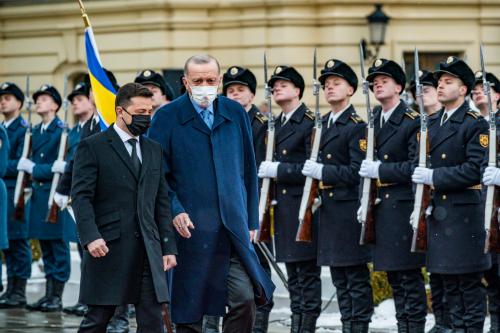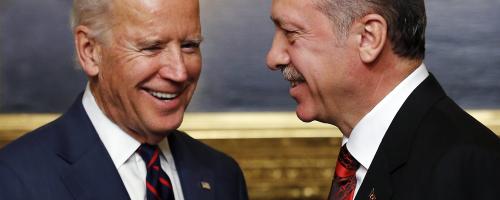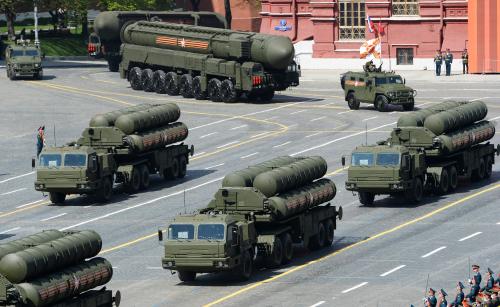The summit this week between Turkish President Recep Tayyip Erdoğan and his Russian counterpart Vladimir Putin is raising concerns about whether Turkey might be turning its back on the West—and this time, for good.
The summit comes on the heels of a growing malaise in Turkey’s relations with the West. Western leaders have criticized the Turkish leadership’s reaction to the July 15 failed coup attempt—especially the purges that have so far targeted 80,000 people in the military, judiciary, media, and education sector. Stronger reactions followed when Erdoğan accused the West of having prior knowledge of the coup and threatened to re-instate capital punishment. The Turkish public, too, is disappointed that the West has expressed so little sympathy for the trauma their country has suffered (nor praise for their stunning defense of Turkish democracy against heavy military equipment). Former Swedish Prime Minister and Minister of Foreign Affairs Carl Bildt, for one, has called for “standing up for Erdoğan.”
The greatest disappointment, however, does not stem from the controversy over whether to extradite to Turkey Fethullah Gülen—a reclusive Islamic cleric that lives in rural Pennsylvania, whom the Turkish government alleges to be the mastermind of the coup—but rather Washington’s delay in issuing an unequivocal statement that condemned the failed coup attempt by renegade officers, in a NATO country no less. And the public also finds it odd that a high-level political visit from the U.S. government has not yet occurred and is still not certain.
Putin rises to the occasion
In contrast to Western leaders, Putin is using the occasion to “reset” Russian-Turkish relations. He is building on Erdoğan’s cleverly-worded letter of apology that enabled him to both save face and meet Putin’s demands for the lifting of sanctions and prepare the ground work for this week’s summit.
Turkey has a long, complicated relationship with Russia that stretches back centuries. Turkish history textbooks highlight the many wars Russia fought against the Ottomans, but also how the Soviets assisted Turkey in pushing back against the Western occupation of Turkey in the aftermath of World War I, as well as how this close relationship remained in the early years of the Republic. However, the relationship came to an end with Stalin’s purges in the late 1930s, and when Turkey’s border with the Soviet Union (the Turkish-Georgian border today) was sealed. The coup de grace came when Stalin made territorial demands on Turkey at the end of World War II and made clear his desire to see a pro-Soviet government in Ankara—along the lines of those in Eastern Europe. This propelled Turkey into the Western fold and Turkey became a member of NATO in 1952.
Whenever Turkey’s relations with the West soured thereafter, many in Turkey entertained ideas in favor of pursuing closer relations with Moscow. A couple of cases in point:
- The then-American President Lyndon Johnson warned then-Turkish Prime Minister İsmet İnönü (a former Ottoman military officer, veteran of the Balkan wars and World War I, as well as the right-hand man of Turkey’s founding father, Atatürk) in 1964 against deploying American-supplied weapons in defense of the Turkish minority in Cyprus. He added that if Turkey ignored his cautions and somehow provoked the Soviets, NATO would not come to Turkey’s aid. Turkey’s political left was gaining electoral strength at the time, and the country’s larger cities were stages for demonstrations against U.S. involvement in Vietnam. Against this background, Turkey sought improved relations with the Soviets, who also supported a number of major industrial projects in Turkey.
- A similar situation erupted in 1975, when the U.S. Congress imposed an arms embargo on Turkey in reaction to the military intervention in 1974 to suppress a coup that, Turkey feared, would lead to a massacre of Turkish Cypriots. On this occasion, too, there were calls to leave NATO and improve relations with the Soviet Union. However, the Soviet invasion of Czechoslovakia in 1968 and Afghanistan in 1979 reminded Turkish leadership of the importance of NATO membership, and convinced them of the wisdom of continuity and caution.
- After the end of the Cold War, the notion of replacing Turkey’s Western vocation with a Eurasian one gained some ground, and was most prominently raised in March 2002 by a four-star general, Tuncel Kılınç. He argued that the European Union was never going to admit Turkey, the implication being that Turkey should leave NATO and instead ally itself with Russia and Iran.
The end of the Cold War, the collapse of the Soviet Union, and the emergence of a globalizing world led Turkey to forge much closer economic and political relations with Russia. Bilateral ties have become especially strong in the last decade: At one point, Russia even ranked as Turkey’s leading trading partner (ahead of Germany); Turkish businesses significantly expanded their operations in Russia; and a visa-free travel regime was instituted between the two countries. Russian tourists poured into Turkey, while Turkish business people went to Russia in great numbers.
But this economic edifice came crashing down when the growing differences between the two countries over Syria culminated in the downing of a Russian fighter plane by the Turkish air force. Putin’s reaction was swift and decisive: He pushed into effect very costly trade sanctions as well as a ban on Russian tourism; many Turkish businesses in Russia were also shut down. In response, Erdoğan revoked the appeal he had made to Putin in November 2013, when he said that Turkey was prepared to give up on EU membership if it would be incorporated into Eurasian institutions. Instead, Turkey sought closer cooperation with NATO. Just ahead of the NATO Summit in June, Erdoğan even criticized the alliance for not being active enough in the Black Sea region. But all this did not prevent him from seeking to reconstruct relations with Russia, as the government faced increasing pressure from within Turkey to improve bilateral trade and bring Russian tourists back.
The summit between the two leaders was pre-planned, but the coup attempt added another layer of importance to it, particularly with Putin promptly offering any post-coup assistance Turkey might need. It comes at a time when the West has failed to sympathize with the dire situation facing Erdoğan and the Turkish public—not to mention the population’s strong conviction that the United States was somehow involved in the coup. People deeply resent that the alleged mastermind of the coup attempt, Fetullah Gülen, resides in the United States and have a hard time believing that the United States somehow had no prior knowledge of Gülen’s plans.
By contrast, these feelings resonate widely across the Russian public and the Kremlin, who perceive their country as a victim of Western plots and therefore also remain resentful of the West. Succinctly put, it provides ideal fodder for an “axis of the excluded.”
Is Turkey saying bye to the West?
This is a big question, and a difficult one to answer with certainty. Turkey’s relationship with the West dates back to the Ottoman Empire, when its leaders turned to the West as a source of inspiration for their modernization efforts. The Turkish republic itself has long aspired to become “Westernized” in a number of fields, such as its system of governance, rule of law, economics, and science, as well as day-to-day life. Since the end of World War II, it has become incorporated into a number of institutions, including the Council of Europe, the International Monetary Fund, NATO, the OECD, and World Trade Organization, and maintains very close relations with the EU—all of which are the institutions that constitute the basis of the international liberal order today.
Furthermore, unlike Russia, Turkey is not an energy exporting country. Instead, it has to have a functioning liberal market economy that can export and attract tourism to generate revenues, jobs, and growth. As much as Russia was an important economic market for Turkish exports in 2014 (the last full year not affected by sanctions), these exports were still less than those to the United States, which is considerably further away. Furthermore, in 2014, 44 percent of Turkey’s export went to the EU, compared to only less than 4 percent to Russia. The vast majority of foreign direct investment in Turkey comes from the EU. It is doubtful whether Russia could provide the technological innovation and the global market access that comes to Turkey with these investments. In spite of the tense political relations with the EU, the bloc is still Turkey’s economic lifeline.
NATO membership should now be more indispensable to Turkey’s national security than it was a month ago.
Additionally, the purges have weakened the Turkish military at a time when Turkey’s neighborhood is in turmoil—where Russia has recently annexed Crimea and ferments secessionism in Ukraine and Georgia (not to mention the threat of the ongoing chaos in neighboring Syria). NATO membership should now be more indispensable to Turkey’s national security than it was a month ago. Furthermore, as much as Turkey has considerably adjusted its policies over Syria and is now seeking closer cooperation with Russia to arrive at a diplomatic solution, it is not clear whether the two countries are actually on the same page on Syria: Many policies need to be ironed out, including those over the issue of PYD (the Kurdish organization fighting ISIS), which Turkey considers a threat to its national security.
Realpolitik should be the guiding principle for Turkish decisionmakers, as they question the merits of the country’s relationship with the West. In the meantime, as Carl Bildt has noted, the West needs to recognize that Turkey has experienced a trauma, and that Erdoğan deserves the benefit of doubt—with the clear caveat that the West will soon want to see concrete signs that the rule of law will be respected, Turkey’s slide toward authoritarianism will be halted, and capital punishment will not be introduced in a moment of frenzy. It’s important to bear in mind what Turkey and its region would look like if Turkey had not joined up with the West. Where would Turkey be today? More prosperous, more stable? Probably not.
Finally, there is no harm in Turkey developing closer relations with Russia; yet this relationship will be more beneficial if Turkey remains in the Western fold and a member of the international liberal order. The West must recognize this, and make sure not to push Turkey into an “axis of the excluded.” In the meantime, the United States should take Turkey’s concerns about Gülenist involvement in the attempted coup very seriously and cooperate in its investigation, even if the extradition issue may be a thorny one. Additionally, more sympathetic public messaging—especially ahead of John Kerry’s possible forthcoming visit—could go a long way in helping to rebuild trust between the two countries.
The Brookings Institution is committed to quality, independence, and impact.
We are supported by a diverse array of funders. In line with our values and policies, each Brookings publication represents the sole views of its author(s).








Commentary
The implications of a Turkish-Russian rapprochement
August 10, 2016